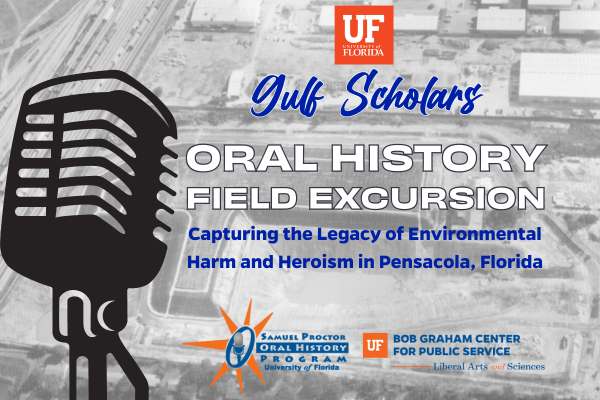 Are you a UF undergraduate student interested in learning more about how environmental issues have long shaped and continue to shape communities along the Gulf of Mexico?
Are you a UF undergraduate student interested in learning more about how environmental issues have long shaped and continue to shape communities along the Gulf of Mexico?
As part of UF Gulf Scholars, the Bob Graham Center for Public Service and the Samuel Proctor Oral History Program invite you to apply to take part in an exciting field excursion to the Florida panhandle.
Selected students must attend an introduction to oral history workshop the week of June 3-7, 2024 in Gainesville where they will learn about the importance of spoken archives and how to work collaboratively with communities during the interview process.
During the field excursion, which takes place Tuesday, June 11 to Friday, June 15, 2024, students will interview residents of Pensacola, Florida who were impacted by several toxic waste sites and were part of the third largest environmental relocation in U.S. history. Following the field excursion, students will process and finalize the collected material for inclusion in the UF Digital Collections.
UF Gulf Scholars will provide transportation, lodging, and food for each of the travel days to Pensacola, Florida.
 What is oral history?
What is oral history?
Oral history is a method of gathering and preserving historical information through recorded interviews with people who have personal knowledge of past events. Oral history is practiced across many disciplines, including history, English, sociology, anthropology, communication, cultural studies, and beyond.
The Samuel Proctor Oral History Program (SPOHP) is the University of Florida’s award-winning oral history program. Since our founding in 1967, SPOHP has conducted over 8,000 interviews, the materials for many of which may be found in the University of Florida’s Digital Collections housed in the University of Florida’s Smathers Libraries. SPOHP is committed to using critical historical inquiry and digital humanities production to encourage civic engagement and dialogue between the past, present, and future.
Location background
From 1943 to 1982, Escambia Treating Company (ETC) operated in Pensacola, Florida, endangering nearby primarily Black communities with toxic dumping. Citizens Against Toxic Exposure (CATE), led by retired schoolteacher Margaret Williams, launched a campaign in 1992, demanding relocation for affected households due to health issues like cancers and respiratory diseases.
The EPA’s investigation in 1991 revealed high toxin levels, declaring the site a public health emergency. Cleanup efforts created “Mount Dioxin,” causing health problems for nearby residents. CATE protested legislative proposals favoring businesses over health concerns.
CATE received support, leading to congressional hearings and Escambia’s placement on the Superfund NPL in 1994. The EPA allocated $100 million for cleanup, but CATE continued advocating for full relocation. In 1996, the EPA agreed to relocate all 358 households, marking the first such relocation under the Superfund program. Concerns about environmental racism and the ETC site’s cleanup persisted.
This field excursion will focus on the experiences of residents 28 years following the relocation.
Program requirements
This opportunity is open to any currently enrolled University of Florida undergraduate student in good standing, with a demonstrated interest in environmental justice issues, particularly in Gulf of Mexico communities. A minimum 3.0 GPA is required to apply.
Selected students must attend an introduction to oral history workshop the week of June 3-7, 2024 in Gainesville. Each student is responsible for processing final materials, which may include transcripts, abstracts, photography, etc.
Program Timeline
- May 19, 2024: Applications due
- May 24, 2024: Students selected and notified
- June 3, 5, 7 (times TBD) in Gainesville: Oral history crash course
- June 11-14: Field excursion to Pensacola, Florida. We will depart Gainesville, FL on the morning of Tuesday, June 11, and return on the evening of Friday, June 14.
- June (date TBD): Student reflection on Zoom
- Fall semester (date TBD): Reception to share work
Program Benefits
By participating, selected students will
- Learn the importance of and best practices for collecting oral histories.
- Learn from and work alongside seasoned oral historians.
- Gain knowledge of environmental issues facing Gulf communities.
- Gain experience working with community groups.
- Have the chance to continue this kind of work as a UF Gulf Scholar.
- Contribute to UF’s Digital Collections.
- Have an opportunity to present their work to other UF students and faculty.
Funding
UF Gulf Scholars will provide transportation, lodging, and food for each of the travel days to Pensacola, Florida for up to six students.
To apply
Submit your application using the following link by 11:59 p.m. on Sunday, May 19, 2024: UF Gulf Scholars Oral History Excursion
Selection
Students will be selected based on their commitment to completing all aspects of the program, interest in learning about environmental justice issues in Gulf communities, and interest in learning more about oral history.
Program faculty and staff
- Becca Burton, UF Gulf Scholars Program Coordinator, Bob Graham Center for Public Service
- Anna Hamilton, Assistant Director, Samuel Proctor Oral History Program
- Marianne Vernetson, Associate Director, Bob Graham Center for Public Service
- Deborah Hendrix, Digital Humanities Production Coordinator, Samuel Proctor Oral History Program
For questions, contact
Becca Burton, UF Gulf Scholars program coordinator, rlburton@ufl.edu
About Gulf Scholars
UF Gulf, housed at the Bob Graham Center for Public Service, aims to prepare students from diverse academic backgrounds with the knowledge, skills, and mindset necessary to address the complex and dynamic challenges facing Gulf of Mexico communities.
With a focus on civic engagement, public service, and leadership, students will explore the environmental, social, economic, historical, and cultural dimensions of the Gulf. Through their participation in the program, students will be better equipped to promote stewardship, resilience, and innovation as they step into the workforce.
Learn more: https://bobgrahamcenter.ufl.edu/uf-gulf-scholars-program/